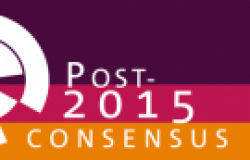The Post-2015 Development Agenda: Investing in Broadband

The twelfth research series from The Post-2015 Consensus' is focused on Infrastructure targets for the post-2015 development agenda. Professor Emmanuelle Auriol and Alexia Lee González Fanfalone from the Toulouse School of Economics suggest in a new analysis that broadband could very well be one of the best investments for the future.
Clearly, the rapid rollout of broadband services has transformed the lives of people in the industrialized world and there is every reason to expect that developing countries could benefit at least as much. Access to market information can make sure farmers know the market price for their surplus crops so they are not cheated by unscrupulous traders, and fishermen can land their catch at the port offering the best price. Economic models project that tripling mobile broadband coverage in the developing world could add up to $400 billion to global GDP and create over 10 million direct jobs.
A World Bank study showed that a 10% increase in broadband penetration increased GDP growth by 1.4% in low to medium income countries. This is important, because the digital divide among developed and developing regions of the world still persists and closing it could give a big boost to development. For example, while mobile broadband is used by over 83% of people in the industrialized world, penetration is only 21% in developing countries.
While governments in Europe and elsewhere continue to invest in faster and better broadband, the biggest benefits will always come from providing Internet connection to people who don’t already have it, most of whom live in developing and emerging countries. Here, the developing world can leap-frog industrialized countries, eschew expensive fiber-optic cables in what is called the “last mile” or access part of the network, and go straight to mobile broadband.
Mobile phone use is already spreading rapidly in developing countries, avoiding the need for old-style fixed infrastructure, and data services can use the same system. In China, three quarters of Internet users access it via mobile phones already, and in Ethiopia and Uganda, four out of five use the mobile internet. Thus rolling out mobile broadband seems a cost effective solution given its pervasiveness and recent technological advances in mobile networks.
The study shows that increasing mobile broadband about three-fold in developing regions – from 21 to 60% – will have a significant cost (about $1.3 trillion). This is simply the cost of the extra infrastructure needed to hook up about three billion more connections to the internet. However, it will also increase GDP growth. By 2020, the benefits would be almost half a trillion annually, and these would increase further towards 2030. Over the coming decades the total benefit would reach about $22 trillion. For every dollar spent on mobile broadband, the academics estimate a benefit of $17 dollars. Investing in mobile broadband for the developing world looks like a really smart move.
If the goal of 60% broadband by 2030 was achieved, it would make each person in the developing world who was previously not connected almost $11,000 richer on average.
Broadband is such an important enabling technology that it is difficult to estimate the complete impact on the economy, which will vary with local circumstances. What the study does show, though, is that rolling out Internet access is money very well spent. Jobs are created directly in the organisation providing the network and indirectly in the supply chain.
Here, Copenhagen Consensus Center has just released its latest research on Infrastructure targets for the post-2015 development agenda. Emmanuelle Auriol, Professor at the School of Economics, University of Toulouse and Alexia Lee González Fanfalone, Doctoral candidate at the School of Economics, University of Toulouse write the main report, peer-reviewed in a perspective paper by Pantelis Koutroumpis, Research Fellow at Imperial College London Additionally, NGOs and stakeholders such as Urban Institute and Alliance for Affordable Internet present viewpoint papers concerning Auriol and Fanfalone’s analysis.


